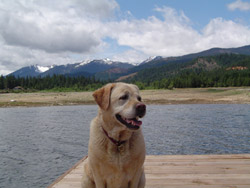 After her husband's death, Rosemary Mendes flees her home on the California north coast and fetches up, more or less by accident, near the small town of Weaverville in Trinity County. There she buys and remodels a small house, becomes a volunteer at the local senior center, makes a few friends. And is keeping herself and her background quietly and peacefully to herself when she finds that her grasping former in-laws have tracked her down.
After her husband's death, Rosemary Mendes flees her home on the California north coast and fetches up, more or less by accident, near the small town of Weaverville in Trinity County. There she buys and remodels a small house, becomes a volunteer at the local senior center, makes a few friends. And is keeping herself and her background quietly and peacefully to herself when she finds that her grasping former in-laws have tracked her down.
She's still trying to decide what to do about this unpleasant development when her young neighbor informs her that another solitary incomer had just been found dead in the surrounding forest, apparently shot by a deer hunter. "Anyway, the interesting thing... nobody knows who to tell, who her relatives are, like that. She's—she was—a mystery woman." Just like Rosemary, was clearly Kim's inference.
The image of that woman, Michelle called Mike, haunts Rosemary's thoughts for the rest of the day. When her veterinarian friend Graham Campbell arrives that evening for their usual Friday-night dinner, he brings not only wine, but a big yellow Labrador retriever named Tank. Tank, he explains to Rosemary, was with his owner, Mike Morgan, when she was shot, and was grazed himself. And now he's depressed and homeless. "Gray, I do not want a dog," says Rosemary firmly.
But not firmly enough. Tank stays, and Rosemary becomes known as the person who has Mike Morgan's dog. Tales of the dead woman come to her from nearly everyone she encounters, and she finds herself pursuing them: who was Mike Morgan and why was she here? It's a pursuit that becomes more and more engrossing—and more and more dangerous.
Reviews
"Among the best is Janet LaPierre's Run a Crooked Mile (Perseverance Press, $14.95). The old show biz warning about never following a child or an animal on stage could have come true in this tale centered around the fate of Tank, a Labrador retriever found in the forest near the body of a local woman nicknamed 'Mike' who appears to be the victim of a hunting accident. Fortunately, LaPierre, the author of nine novels in the Port Silva series, is well aware of the dangers adorabale mutts can present and thus takes care in crafting Rosemary Mendes, a just-as-fascinating human character who adopts the homeless pooch. A widow hiding out from her lunatic former in-laws, Rosemary is leading an isolated life in California's Trinity Alps, but aided by the selfless Tank, she begins to form an almost psychic bond with the dead woman. This bond almost gets Rosemary killed when she decides that the woman was murdered, not shot by accident. But by whom and why? Solving the puzzle is more difficult than in the usual mystery novel because no one even knows 'Mike's' real name or where she came from. The characters in Run a Crooked Mile are a fascinating lot, and the northern California setting is so meticulously detailed that we can almost smell the trees and dirt. And Rosemary, bless her loner heart, makes an independent protagonist we'll want to see more of."
—This review originally appeared in Betty Webb's "Small Press Reviews" column in Mystery Scene Magazine, Spring #109. Reproduced by permission.
"Two women have moved to Weaverville, CA, to escape from their former lives. When Mike Morgan is shot to death, Rosemary Mendes adopts Mike's dog. Finding the similarities in their situations too intriguing, Rosemary is soon probing into who Mike was and why she was murdered. A sense of impending danger slowly invades Rosemary's quiet life. For readers who like strong women characters in the tradition of the female sleuths of Jan Burke and Louise Penny, LaPierre's (Baby Mine; Family Business) stand-alone novel works its magic."
—Library Journal, February 1, 2009
"When Michelle 'Mike' Morgan turns up shot in the back near her woodland cabin, Rosemary Mendes takes in Mike's dog and determines to uncover the dead woman's past in LaPierre's well-plotted stand-alone, which vividly paints life at its simplest—and ugliest. Rosemary has moved to Northern California's sparsely populated Trinity County to shake the threats of her deceased husband's money-grubbing relatives and for the peaceful, slower-paced lifestyle. In fact, between her worrisome neighbors and vandalism problems, her life has hardly been uneventful—and Sheriff Gus Angstrom, a widower, is clearly interested in more than her case-related information. Murder and kidnapping drive the action to a heart-slamming conclusion. Fans of LaPierre's cozy series set in Port Silva, Calif. (Family Business, etc.), will find virtually no gore, but they should be prepared for the kind of language typical of a gritty police procedural."
—Publishers Weekly, February 9, 2009
Excerpt
Prologue
The body was visible but not eye-catching. The once-white soles of sneakers were grayed by wear and dust, the washed-out blue of denim jeans further dimmed by wind-blown, rain-splashed dirt and a scatter of leaves and pine needles. The upper torso and outflung arms, clad in a heavy gray sweatshirt, were partly buried in the duff of the forest floor, as if the person had tried to burrow into the ground, or had simply plowed up the earth's surface when flung forward.
The shattered head, a garish mush of red blood and white bone and gray brain matter two days earlier, had since darkened and dried and no longer stood out so brightly against the muted late-September colors of the mostly conifer forest.
 The dog was highly visible. A medium-sized, sturdily built animal with a heavy head, a thick, straight tail, and a chewed rope end dangling from his neck, he wore a dense double coat shading from warm caramel-tan on head, back, and legs to a glistening silver-white on breast and belly, its surface so slick that dirt didn't cling.
The dog was highly visible. A medium-sized, sturdily built animal with a heavy head, a thick, straight tail, and a chewed rope end dangling from his neck, he wore a dense double coat shading from warm caramel-tan on head, back, and legs to a glistening silver-white on breast and belly, its surface so slick that dirt didn't cling.
Lying beside the body, nose on forepaws, he lifted his head, bristled, and growled deep in his throat at the distant rumble of an engine. As the sound faded, he gave his head an ear-flapping shake, whined softly, and after a moment twisted around to lick at the narrow gash that raked his left shoulder and ribs. Then, with a heavy sigh, he put his head back down.
Some time later a rustle in the brush nearby brought him to his feet with a growl and then a bark. A gray squirrel scurried up a tree and leapt to another. The dog watched, sat to scratch, nosed his wound again, and then set off at a trot through the brush, to a small stream that gurgled gently as it trickled over a rocky bed.
The dog drank for a long time, pausing twice to lift his head, cock his ears, and test the air with his nose. Finished, he backed out of the shallow water, shook himself, and turned to retrace his steps. He circled the body, put his nose to a shoulder, then to a leg, whining each time. Another shake, and he went back to the shallow depression in the duff, turned around several times, and lay down again, sighing deeply as he put his head on his paws.
© Janet LaPierre.